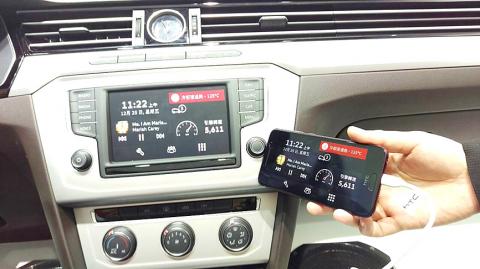HTC Corp (宏達電) yesterday unveiled a vehicle performance measurement solution created in collaboration with German automaker Volkswagen AG (VW) in a bid to enter the fast-growing Internet of Vehicles (IoV) market.
IoV refers to dynamic mobile communications systems that allow communications between vehicles; vehicles and roads; vehicles and people; and vehicles and sensors.
The Taiwanese smartphone maker has been attempting to expand its reach in the IoV market in recent years.

Photo: CNA
In 2011, HTC partnered with Luxgen Motor Co (納智捷), a automobile brand operated by Yulon Motor Co (裕隆汽車), to allow people access to HTC’s entertainment system in their vehicles.
The latest partnership with Volkswagen comes after the company on Monday last week said that it is looking to work with automaker Audi AG to provide its Vive virtual reality (VR) headsets to potential customers so that they can virtually test-drive a vehicle.
Under the partnership with Volkswagen, HTC said a “Customer-Link” app and “Customer-Link Bridge” platform have been launched to allow drivers to gain access to up-to-the-minute information on road and traffic conditions.
The Customer-Link Bridge is a vehicle performance measurement device, while the Customer-Link app provides local traffic information and instant vehicle data to improve security and efficiency while driving, HTC said.
The Customer-Link app can be used in all models of Volkswagen vehicles sold in Taiwan and the Customer-Link Bridge is to be preinstalled in all new vehicles VW sells from May next year, the company said.
Volkswagen said the data will be integrated, appearing simultaneously on the smartphone and auto display of drivers.
“IoV solutions enable owners to be easily connected to their cars and enjoy Volkswagen customer services,” Volkswagen Taiwan managing director Bernd Hoffmann said in a statement.
HTC’s IoV solutions are to be showcased at the Taipei International Auto Show, which is to begin today and run through Sunday next week at the Taipei World Trade Center’s Exhibition Hall 1 and Nangang Exhibition Hall.

‘SWASTICAR’: Tesla CEO Elon Musk’s close association with Donald Trump has prompted opponents to brand him a ‘Nazi’ and resulted in a dramatic drop in sales Demonstrators descended on Tesla Inc dealerships across the US, and in Europe and Canada on Saturday to protest company chief Elon Musk, who has amassed extraordinary power as a top adviser to US President Donald Trump. Waving signs with messages such as “Musk is stealing our money” and “Reclaim our country,” the protests largely took place peacefully following fiery episodes of vandalism on Tesla vehicles, dealerships and other facilities in recent weeks that US officials have denounced as terrorism. Hundreds rallied on Saturday outside the Tesla dealership in Manhattan. Some blasted Musk, the world’s richest man, while others demanded the shuttering of his

ADVERSARIES: The new list includes 11 entities in China and one in Taiwan, which is a local branch of Chinese cloud computing firm Inspur Group The US added dozens of entities to a trade blacklist on Tuesday, the US Department of Commerce said, in part to disrupt Beijing’s artificial intelligence (AI) and advanced computing capabilities. The action affects 80 entities from countries including China, the United Arab Emirates and Iran, with the commerce department citing their “activities contrary to US national security and foreign policy.” Those added to the “entity list” are restricted from obtaining US items and technologies without government authorization. “We will not allow adversaries to exploit American technology to bolster their own militaries and threaten American lives,” US Secretary of Commerce Howard Lutnick said. The entities

Minister of Finance Chuang Tsui-yun (莊翠雲) yesterday told lawmakers that she “would not speculate,” but a “response plan” has been prepared in case Taiwan is targeted by US President Donald Trump’s reciprocal tariffs, which are to be announced on Wednesday next week. The Trump administration, including US Secretary of the Treasury Scott Bessent, has said that much of the proposed reciprocal tariffs would focus on the 15 countries that have the highest trade surpluses with the US. Bessent has referred to those countries as the “dirty 15,” but has not named them. Last year, Taiwan’s US$73.9 billion trade surplus with the US

Prices of gasoline and diesel products at domestic gas stations are to fall NT$0.2 and NT$0.1 per liter respectively this week, even though international crude oil prices rose last week, CPC Corp, Taiwan (台灣中油) and Formosa Petrochemical Corp (台塑石化) said yesterday. International crude oil prices continued rising last week, as the US Energy Information Administration reported a larger-than-expected drop in US commercial crude oil inventories, CPC said in a statement. Based on the company’s floating oil price formula, the cost of crude oil rose 2.38 percent last week from a week earlier, it said. News that US President Donald Trump plans a “secondary